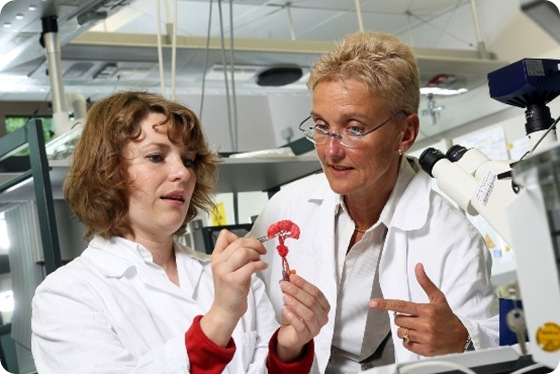Jun 25 2009
If you have hay fever, headaches or a cold, it's only a short way to the nearest chemist. The drugs, on the other hand, can take eight to ten years to develop.
Until now animal experiments have been an essential step, yet they continue to raise ethical issues. "Our artificial organ systems are aimed at offering an alternative to animal experiments," says Professor Heike Mertsching of the Fraunhofer Institute for Interfacial Engineering and Biotechnology IGB in Stuttgart. "Particularly as humans and animals have different metabolisms. 30 per cent of all side effects come to light in clinical trials." The test system, which Professor Mertsching has developed jointly with Dr. Johanna Schanz, should in future give pharmaceutical companies greater security and shorten the path to new drugs. Both researchers received the "Human-centered Technology" prize for their work.
"The special feature, in our liver model for example, is a functioning system of blood vessels," says Dr. Schanz. "This creates a natural environment for cells." Traditional models do not have this, and the cells become inactive. "We don't build artificial blood vessels for this, but use existing ones - from a piece of pig's intestine." All of the pig cells are removed, but the blood vessels are preserved. Human cells are then seeded onto this structure - hepatocytes, which, as in the body, are responsible for transforming and breaking down drugs, and endothelial cells, which act as a barrier between blood and tissue cells.
In order to simulate blood and circulation, the researchers put the model into a computer-controlled bioreactor with flexible tube pump, developed by the IGB. This enables the nutrient solution to be fed in and carried away in the same way as in veins and arteries in humans. "The cells were active for up to three weeks," says Dr. Schanz. "This time was sufficient to analyze and evaluate the functions. A longer period of activity is possible, however." The researchers established that the cells work in a similar way to those in the body. They detoxify, break down drugs and build up proteins. These are important pre-conditions for drug tests or transplants, as the effect of a substance can change when transformed or broken down - many drugs are only metabolized into their therapeutic active form in the liver, while others can develop poisonous substances. The researchers have demonstrated the basic possibilities for use of the tissue models - liver, skin, intestine and windpipe. At the moment, the test system is being examined. Within two years it could provide a safer alternative to animal experiments.